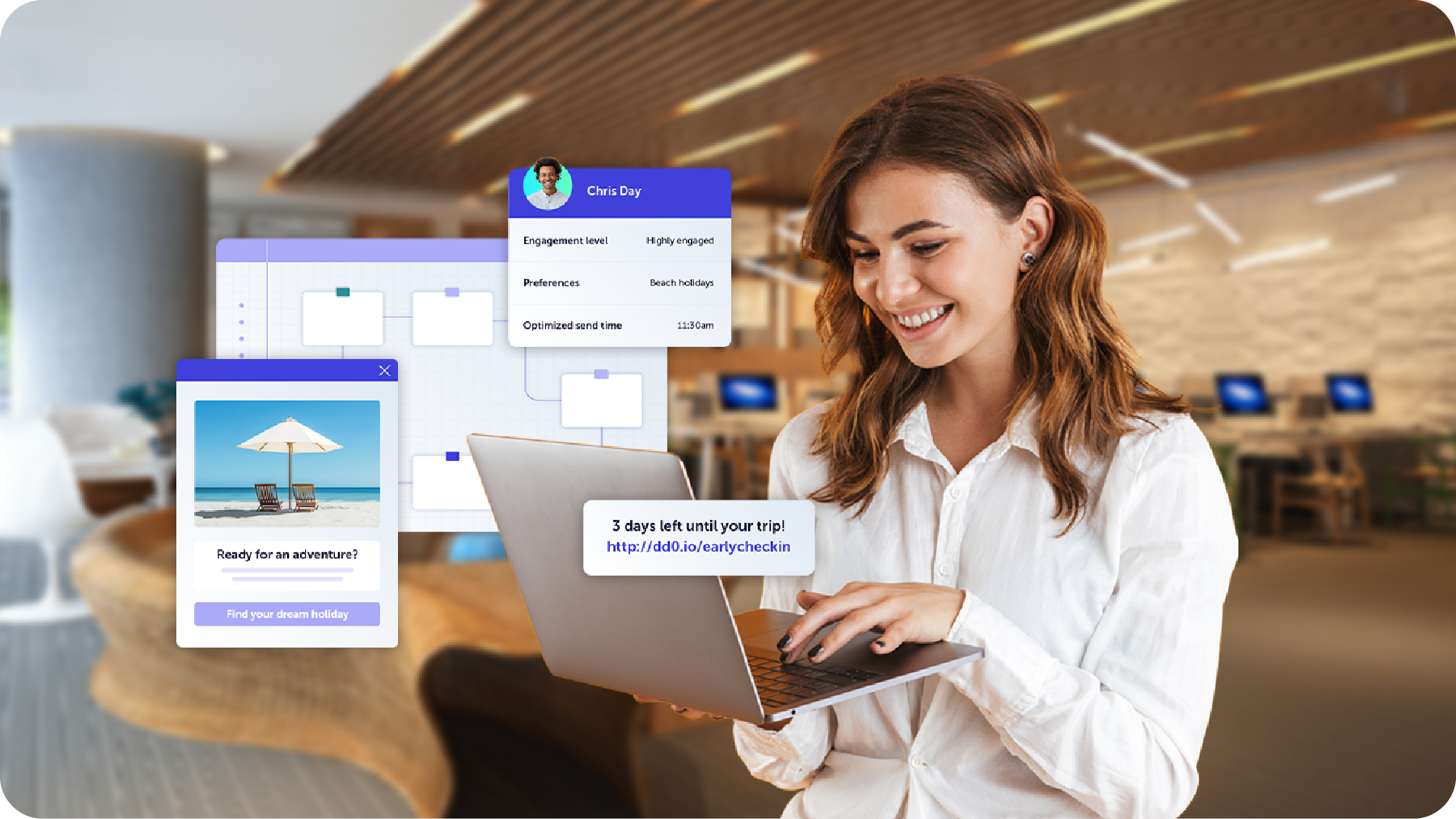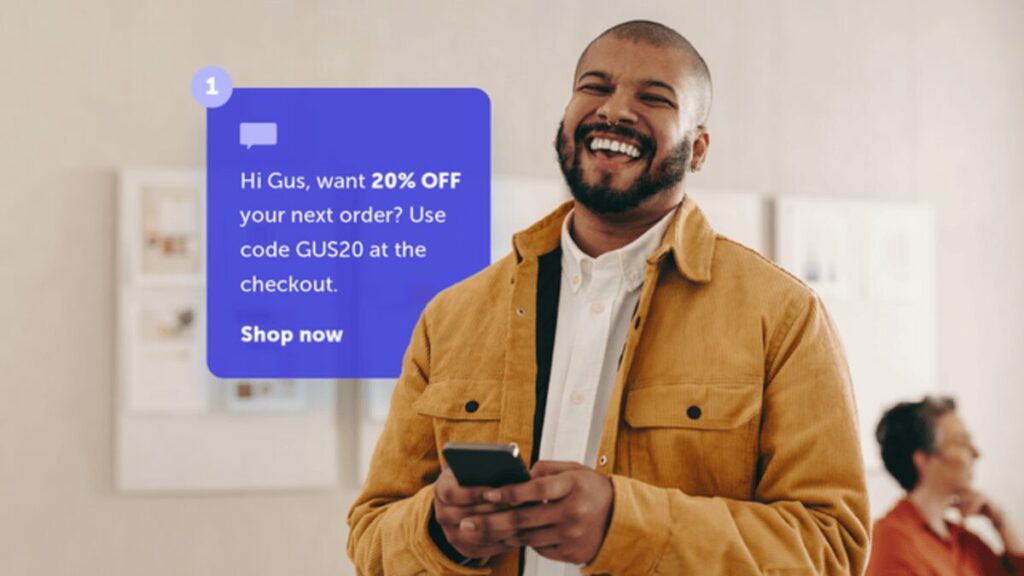How to use marketing automation in the travel industry

Did you know that 81% of travel bookings are abandoned before completion? In an industry facing immense challenges brought on by the global pandemic, travel agencies and businesses need to find innovative ways to adapt and stay afloat. One effective solution that can significantly impact and revolutionize the travel industry is marketing automation.
With marketing automation, you can streamline your travel marketing strategy, maximize efficiency, and breathe new life into your campaigns. In this comprehensive guide, we’ll explore the benefits that marketing automation brings to the travel industry and the strategies you can implement starting today
The advantages of marketing automation in the travel industry
Marketing automation has revolutionized the travel industry, allowing you to optimize your marketing efforts and engage with customers on a deeper level. Some key advantages of implementing marketing automation in the travel industry include:
- Enhanced customer personalization: With marketing automation, you can create personalized experiences for each customer based on their travel history, preferences, and previous bookings. This level of personalization can lead to higher customer satisfaction and loyalty.
- Improved efficiency: Marketing automation enables you to automate repetitive tasks like email marketing, social media posting, and lead nurturing. This leads to considerable time and resources saved, allowing your team to focus on more important tasks.
- Customer experience: With a customer data platform (CXDP) you can collect, manage, and analyze customer data. This helps you make data-driven decisions for your travel marketing strategy.
- Improved targeting: Marketing automation allows you to segment your customers based on demographics and interests, creating targeted and relevant marketing campaigns.
- Scalability: As your travel business grows, marketing automation can scale with it, enabling you to maintain high-quality customer experiences while expanding your target audience and service offerings.
- Stronger customer retention: Regular communication at the right time can nurture clients for stronger retention and loyalty, leading to more future bookings.
Now that we understand the benefits of marketing automation in the travel industry let’s dive into strategies and programs that can help you put these advantages into practice
How to use marketing automation in the travel industry
To effectively incorporate marketing automation into the travel industry, consider implementing the following strategies and programs in your marketing plan:
1. Customer onboarding
In the travel marketing industry, an effective customer onboarding process can make a big difference in building strong customer relationships from the start. You can start by creating automated welcome emails that will be sent to new customers, introducing them to your brand’s offerings, travel tips, and exclusive promotions. By providing valuable content and a smooth onboarding experience, you can set a positive tone for your relationship with the customer, which in turn increases the likelihood of future bookings.
In addition to welcome emails, you can also consider sending automated personalized onboarding messages that address specific customer needs, such as offering recommendations for places to visit based on their travel history or preferences. This can help to build trust with the customer and show them that you understand their needs and interests.
2. Pre-trip communication
Pre-trip communication is a crucial step in ensuring that travelers feel prepared and excited as their trip approaches. By using automated communication like emails, push notifications, and SMS messages, you can keep travelers informed about important details such as their itinerary, destination guides, weather forecasts, and other relevant travel tips easily. This not only helps to build anticipation for the trip but also ensures that travelers have everything they need to make the most out of their travel experience.
Moreover, pre-trip communication also helps to establish a positive relationship with travelers, as they feel that their needs and preferences are being taken into account. This can lead to greater customer satisfaction and loyalty, as well as positive word-of-mouth recommendations.
3. Booking confirmations
Booking confirmations play a crucial role in ensuring customer satisfaction and loyalty. Sending timely and relevant booking confirmations adds to the seamless customer experience and helps build trust. With AI-powered booking systems, you can instantly send confirmation emails to your customers as soon as they complete a booking. These emails can include all relevant reservation details, payment information, and next steps, providing your customers with all the information they need without any extra effort on your part.
4. Abandoned booking recovery
Recovering abandoned bookings is a crucial aspect of your travel brand’s marketing strategy. Many times, customers may abandon their bookings halfway through the process, leading to a significant loss of revenue for your brand. However, marketing automation platforms like Dotdigital can help you recover these abandoned bookings.
By tracking when a customer abandons their cart, you can automatically send them a reminder email with a personalized offer. This can encourage your customers to complete the booking and help your brand recover lost revenue. Moreover, this approach demonstrates that your travel brand values its customers and is willing to help them make the booking process as smooth as possible, which can improve the overall customer experience.
5. Automated post-trip follow-up emails
When it comes to improving customer satisfaction and retention, regular communication is key. One effective way to achieve this is by sending automated post-trip follow-up emails. These emails can help you gather valuable feedback from customers, including reviews, suggestions, and testimonials.
By requesting feedback from your customers, you can identify areas for improvement in your services and make necessary changes. This can help you maintain a competitive edge and improve your reputation in the market. Additionally, customers appreciate when their opinions are taken into consideration, which can lead to increased loyalty and repeat business.
When creating your post-trip follow-up emails, it’s important to keep things concise and to the point. Thank the customer for choosing your service and express your desire to improve based on their feedback. Provide clear instructions on how they can leave a review or provide suggestions, and make it easy for them to do so.
6. Triggered customer loyalty programs and rewards
Customer loyalty programs and rewards are important if you want to build long-lasting relationships with your customers. By using marketing automation to track customer behavior, you can gain insights into your customers’ preferences and behavior patterns, and tailor their loyalty programs and rewards accordingly.
For instance, you could offer triggered discounts or exclusive experiences to repeat customers. This not only incentivizes future bookings but also fosters brand loyalty. These rewards can be customized based on the customer’s past behavior, such as their preferred destinations, activities, or travel styles. This approach makes customers feel valued and appreciated and encourages them to book with you again in the future.
7. Cross-selling and upselling opportunities
Marketing automation is a powerful tool that can help you identify cross-selling and upselling opportunities. With the help of AI-based algorithms, you can easily analyze customer data and recommend relevant products or services based on their preferences and purchasing history. By doing so, you can increase your revenue and enhance the customer experience.
Cross-selling and upselling are two important strategies that can help increase customer lifetime value (CLV). Cross-selling is the process of selling products or services that are related to the customer’s original purchase, while upselling involves offering a more expensive version of the same product or service. By using marketing automation, you can easily identify these opportunities and offer personalized recommendations to your customers.
For example, if a customer has booked a flight to a particular destination, you can use marketing automation to recommend hotels, car rentals, and other activities in that destination. By doing so, you’ll increase your revenue and enhance the customer experience by providing personalized recommendations based on the customer’s preferences.
8. Real-time updates
An important aspect of providing a positive travel experience for customers is ensuring that they have access to accurate and up-to-date information about their trips. In today’s fast-paced world, travelers expect real-time updates that keep them informed of any changes or adjustments to their itinerary.
Thankfully with cross-channel marketing automation at your fingertips, you can deliver essential updates seamlessly and efficiently across various communication platforms. Keep travelers informed through instant push notifications, SMS alerts, and other targeted messaging about last-minute flight changes, itinerary adjustments, or crucial announcements. This helps travelers stay informed and avoid any inconvenience resulting from not having timely information.
Providing accurate and timely information not only strengthens trust between you and your customers but also enhances the overall travel experience. When travelers have confidence in the information they receive, they are more likely to feel comfortable and relaxed throughout their journey. This can lead to increased customer satisfaction and loyalty, ultimately benefiting you as well.
9. Behavioral triggers
Behavioral triggers are a powerful way to segment your customers and provide them with more personalized experiences. By analyzing specific customer behaviors, such as their browsing history or purchase patterns, you can gain valuable insights into their preferences and interests. With this information, you can then send targeted and automated recommendations or promotions that are more likely to resonate with them.
For example, if a customer frequently browses luxury accommodations on your website, you could send them recommendations for trip upgrades that match their preferences. Or, if a customer has shown a strong interest in outdoor activities in a particular destination, you could suggest destination-specific activities that are tailored to their interests.
By using behavioral triggers, you can not only improve the relevance of your marketing messages but also enhance the overall customer experience. By providing customers with personalized recommendations and promotions, you can build trust and loyalty, which can ultimately lead to increased sales and revenue for your business.
10. Automated nurturing campaigns
Automated nurturing campaigns can be an effective tool in the travel industry. Customers often require a lot of information before they decide to book a trip. By creating a series of automated emails, you can lead your customers through the sales funnel and provide them with the necessary information at different stages of their journey.
For example, when a customer signs up for your newsletter, you can send them a welcome email with helpful tips on planning a trip. As customers continue to engage with your brand, you can send them personalized emails with recommendations based on their travel preferences, such as adventure travel, romantic getaways, or family vacations.
Moreover, you can use an automated re-engagement campaign to bring back previous customers. This will remind them of your brand and encourage them to consider booking with you again.
Elevate your travel strategy with marketing automation
In conclusion, implementing marketing automation in your travel strategy can help you streamline your communication, increase customer engagement, and ultimately drive more bookings. By leveraging the power of marketing automation tools like Dotdigital, you can create personalized and relevant experiences for your customers that will keep them coming back for more.



